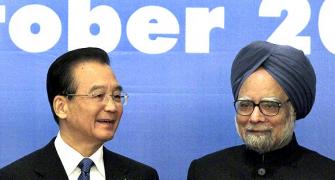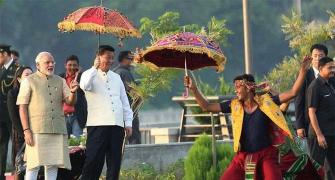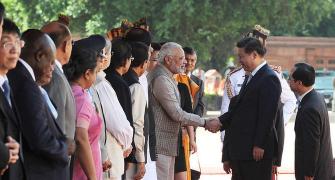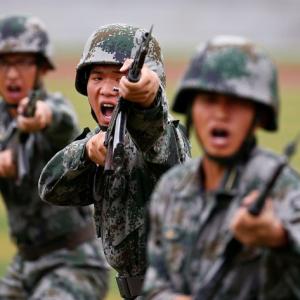'Our equations with China require engagement and not confrontation; its interfaces with Pakistan and with some other South Asian neighbours also add to the complexities,' says Vice Admiral Premvir Das (retd).
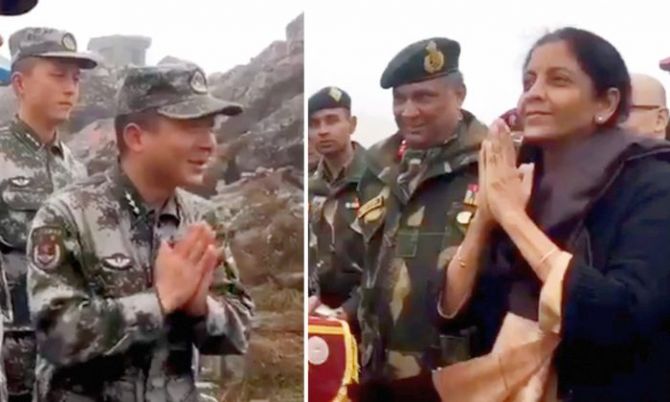
IMAGE: Defence Minister Nirmala Sitharaman in a brief interaction with Chinese soldiers during her maiden visit to the Nathu La border post in Sikkim, October 9, 2017.
Several recent developments have further highlighted the need for India to develop a holistic national security strategy.
The first was the emergence of a new 'Quadrilateral' in this part of the world (referred to as the Indo-Pacific), comprising the United States, India, Japan and Australia.
Navies of these four countries had joined together in a two-day exercise at sea in 2007, after which the then UPA government decided to discontinue participation, mindful of Chinese sensitivities.
A decade later came a meeting of officials of the four countries in Manila and even if the agenda was nothing dramatic, this grouping has now become formalised.
There are also several other bi-laterals and tri-laterals in which India has a place, each of varying purpose and productivity.
However, this piece is about a larger dimension in which India is, or may soon, be placed.
Every US president puts out his vision of global security in a national security strategy and President Donald J Trump has articulated his own.
This clearly identifies Russia and China as 'revisionist' and 'disruptive nations' which can harm American interests.
This articulation has now been followed by its defence strategy, in which the US sees itself in competition with China and Russia in the Indo-Pacific.
India is not mentioned specifically, but is clearly seen as one of the 'key countries in the region' with which America must work in synergy.
The Trump NSS puts India in some quandary by describing India as an 'emerging global power' and, by implication, in partnership with it.
While this may bring good cheer to most of our countrymen, we must analyse what this means for us.
First, assigning this status to India makes it a power which, at least presently, it is not.
Second, with Russia and China clearly identified as being hostile to US interests, the NSS formulation presumes that India is similarly affected. This is simply not true.
Leaving aside economic parameters (our GDP is just one-fifth of China's and one-tenth that of the US), the trade relationship between India and the US is a pittance compared to what it is between that country and China.
To expect that those two can enter into any serious military confrontation is simplistic.
On the other hand, China is India's immediate neighbour, occupying large tracts of our territory, and the possibility of military conflict between the two, even if unlikely, cannot be ruled out.
At another level, Russia, which is seen as adversarial in the US strategy, is India's friend of long standing and has been its main supplier of military hardware in which the lease of nuclear submarines and assistance in their indigenous production stand out.
India also has strategic interests in Iran which, though considered a 'rogue' by Mr Trump, has energy resources and also offers access to Central Asia.
In short, it is difficult to see how we fit in the US scheme as outlined in its latest NSS. Add to this our problems with terrorism.
Thus, while the quadrilateral is of four countries with the unstated common goal of 'containing' China, the other scenarios are full of inconsistencies.
For the US, China is clearly the challenger to its global supremacy and for India, the primary threat.
This creates some kind of synergy, albeit a little far-fetched, as the Chinese do not constitute any territorial threat to the Americans.
India cannot also match the economic importance of China to the US. So, elevation of India to global player status is largely semantic.
It is possibly driven by President Trump's interest in India's defence purchases; with $15 billion of American military hardware already done, the figure could well reach $25 billion in the next five to six years.
Wooing this market with platitudes is, therefore, logical.
India is the largest and most militarily capable Indian Ocean power, so describing it as a partner also makes sense.
Looked at from the US point of view, upgrading India is therefore understandable.
The issues for India are different. While a healthy defence relationship with the US helps us in getting sophisticated military capabilities and this is a benefit of no small consequence, our equations with China require engagement and not confrontation; its interfaces with Pakistan and with some other South Asian neighbours also add to the complexities.
The relationship with Russia, which the US sees in negative terms, is even more critical for reasons already highlighted; in recent years, this interface seems to have suffered somewhat even though the military relationship continues.
To this should be added a somewhat disconcerting closeness in the Sino-Russian relationship in recent years.
In the South China Sea, despite the recent gathering of ASEAN leaders in Delhi and their deliberations on maritime security, not all of those countries are as amenable to our positions in that region as they are to those of China, which is also their largest trading partner.
To sum up, there are many uncertainties in the emerging world order which affect India's security, and in which management of our interests needs careful calibration.
Are these scenarios essentially contrarian is a question that might well be asked. One is ostensibly structured to contain China in the Indo Pacific, which has its own logic, while the other has China as a major player, with which most global powers, especially the 'emerging' ones, must engage.
For India, in particular, the Trump NSS poses questions which have not been faced so far. Integrating our long-proven relations with one friend with those being developed with a new one when those two themselves are at odds with each other is one dilemma; interacting with a potential adversary is another.
There are other important countries, especially those in our immediate and near neighbourhoods, which impact our security concerns.
How to play this chessboard and to respond with suitable capabilities is a challenge that the policy-makers face.
Most major powers articulate strategies crafted to suit their needs but, until now, India has shied away from doing so.
This may have prevented us from generating capabilities that would adequately safeguard our interests.
It is time this inadequacy is rectified.
Vice Admiral Premvir Das (retd) is a former Director General Defence Planning Staff. He has also served in the National Security Advisory Board.


